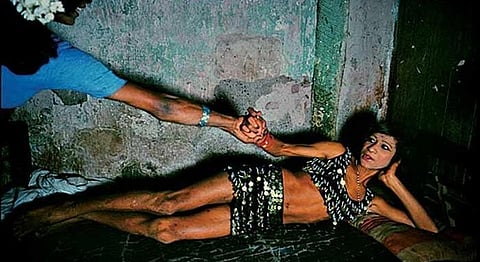
- HOMEGROWN WORLD
- #HGCREATORS
- #HGEXPLORE
- #HGVOICES
- #HGSHOP
- CAREERS
- ABOUT US
- CONTACT US

“The cage girls do everything to attract the men: they beckon and shout and grab at them; sometimes they pull up their skirts and make obscene gestures” -Mary Ellen Mark
In the midst of Bombay’s loud traffic jams, busy vendors attracting patrons with brassieres, stationery, magazines and so forth there was once a colourfully grotesque and special world. Whilst the rest of the city overlooked this vivid community in the late 70’s, one phenomenal photographer from New York saw them for their immense spirit and grit. Mary Ellen Mark’s body of work capturing the ignored underbelly of 1978-79 Bombay gave the world an insight into Falkland Road’s sex workers.
Renowned for her bold work with under-appreciated sections of society, especially in India, Mark’s lens revealed moments and lives with unique grace. Her body of work following the Indian Circus through the ‘80s and ‘90s is an exceptional example of her strong bond with India. Mark’s beautiful and moving photo essay of Falkland Road transports us back in time to the late 70s - a time when social taboos and outcasts were swept under the rug even more than they are today. At a time where women themselves struggled to have a defined voice, Mark was one of the first to break barriers by giving the microphone to the socially denounced ‘dirty’ prostitutes of Falkland Road.
Mark captured old wooden buildings which lined this street, with caged ground floors that teemed with decorated girls (ranging from eleven-year-old prostitutes to sixty-five-year-old ex-madams) being surveyed by potential customers. Rising above these cages towards the sky were three or four more storeys, where girls sat in clusters on window-sills summoning potential work.
Mark’s initial attempts to capture this world of brothels, madams and their girls, soliciting transvestites, homeless street prostitutes and their incredibly challenging lives were met with hostility, aggression and rejection. With time, she won the confidence of Falkland Road’s sex workers and was welcomed into intimate, personal moments of their lives. Her close relationship with these women helped her paint a vivid picture of Bombay’s sex workers in the late 70s. Her stunningly electric, bold and powerful photographs captured the raw essence of Falkland Road’s fabric of humanity better than anyone else has been able to do since 1979.
The women working on Falkland Road were often arrested for soliciting. Many of their boyfriends, who were often in and out of jail, would beat these girls and take their earnings. STDs like AIDs were rampant, while pregnancy always a coin-toss chance. These women craved a momentary escape - a place of solace for a second, even. Olympia Cafe, the largest and most beautiful cafe on the street, became their favourite safe space for refuge.
Champa, a transvestite madam of a brothel house, and Saroji, a former prostitute and now madam, became Mark’s comrades during her years capturing Falkland Road. They invited her into their houses, and opened up their world to her tender, understanding lens.
Mark elegantly, but boldly exposed the multi-layered, colourful world of the forgotten sex workers of Bombay’s Falkland Road. Struggling on the fringes of society, these women were given a chance to show the world their joy, pain, community, family, lives and realities through Mark’s extraordinary narrative of photography.
